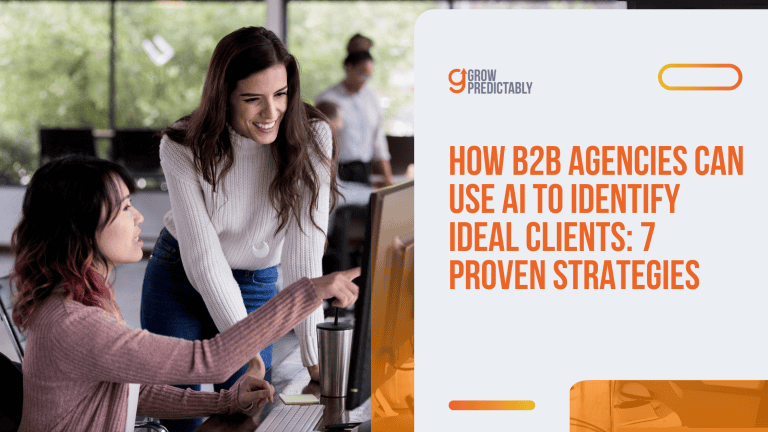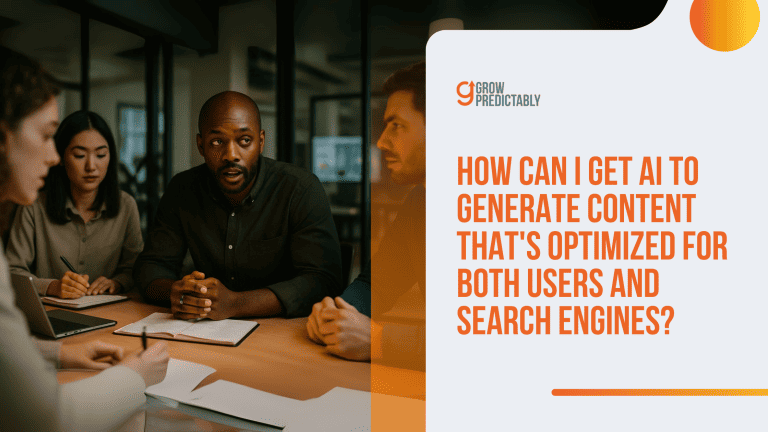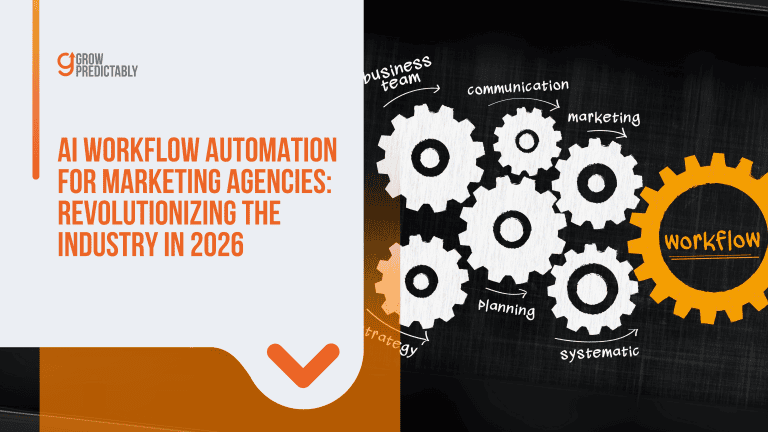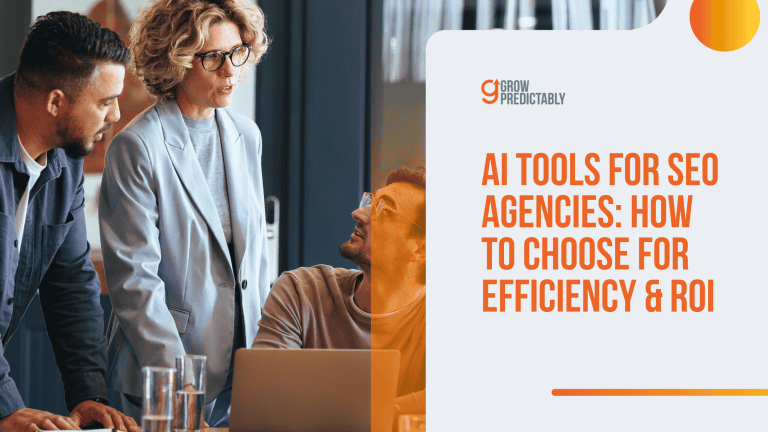The Complete Guide to Building An AI Integrated Digital Agency in 2026
I’ve seen this first-hand.
Agencies diving into AI just for the badge of “innovation.”
But most fail to see ROI because there’s no strategic plan.
The successful ones? They identify their biggest roadblocks, apply AI smartly, and track wins meticulously.
That’s real growth.
This guide will give you a no-nonsense roadmap to building an AI integrated digital agency with today’s effective tactics.
Let me show you how to supercharge your agency with AI through six straightforward steps.
TL;DR
Building an AI‑integrated digital agency means solving specific bottlenecks with AI, not collecting shiny tools. Agencies that pick a clear niche, assemble a lean AI-savvy team and stack, productize AI-powered services, and rigorously track ROI turn AI from a buzzword into a lasting competitive advantage.
KEY TAKEAWAYS
- Demand is surging: Most marketers already use AI and plan to increase adoption, while many organizations are still piloting—creating a wide gap for agencies that bring real AI expertise and implementation.
- Choose a focused niche: Define who you serve, which problems you solve, and how your AI approach is different, then align positioning, offers, and case studies tightly around that segment.
- Build the right team and stack: Combine AI strategists, technical implementers, and marketers on top of a secure, interoperable data and tooling layer instead of overbuying disconnected platforms.
- Productize AI services: Package high-demand capabilities—predictive analytics, AI-enhanced content, personalization, chatbots, and automated media buying—into measurable, ongoing retainers.
- Bake in ethics and compliance: Treat data privacy, security, copyright, and governance as non‑negotiables so enterprise clients see you as a safe, long‑term AI partner rather than a risky experiment.
Table of Contents
The Demand for AI-Integrated Digital Marketing
The integration of artificial intelligence and machine learning into digital marketing by innovative marketing agencies is no longer a futuristic concept—it’s rapidly becoming the industry standard.
As businesses seek to leverage data-driven insights and automation for competitive advantage, AI-integrated digital marketing agencies are positioned to experience significant demand growth in the coming years.
But just how substantial is this trend, and what value do these specialized agencies bring to the table?
The Growth Trajectory of AI in Marketing
As organizations look for smarter ways to engage customers and optimize operations, AI tools are being adopted across various functions—from customer service to campaign automation.
According to McKinsey, 72% of businesses reported adopting AI in at least one function in 2024, up from just 55% in 2023. (Source)
In marketing specifically, AI is helping brands personalize content, forecast trends, and improve customer targeting.
It’s no surprise that 61% of marketers say AI is the most important aspect of their data strategy. (Forbes)
AI is also significantly improving operational processes.
A report from McKinsey notes that companies leveraging AI for marketing and sales see up to a 20% increase in customer satisfaction. (Source)
Furthermore, AI-powered customer service tools like chatbots are gaining momentum, with 80% of consumers reporting satisfaction with AI-driven support experiences. (Source)
As technology continues to evolve, AI’s role in business will likely expand, offering even more precise analytics, faster decision-making, and stronger customer experiences.
Current Adoption Rates Signal Strong Demand
The current adoption rates of AI in marketing further validate the growing demand.
According to recent statistics from Martech.org:
- 94% of organizations use AI to prepare or execute marketing
- 69% of marketers had already integrated AI into their marketing operations in 2024
- 88% of marketers rely on AI in their jobs
- 85% of marketers use AI writing tools or content creation tools
What’s particularly telling about the future demand for AI-integrated agencies is that 85.8% of marketing professionals plan to increase their use of AI in the next 36 months, and 9 out of 10 marketers are set to ramp up AI integration in 2025. (Source)
This widespread adoption and planned expansion underscore the growing recognition of AI’s value in marketing strategies.
Market Implementation Status
The implementation of AI in marketing is still evolving, creating significant opportunities for a specialized AI marketing agency.
Currently:
- 32% of marketing organizations have fully implemented AI
- 43% of marketing organizations are experimenting with AI
- 51% are either piloting or scaling AI, up from 42% in 2023
These statistics reveal that many organizations are still in the early stages of AI adoption, presenting a clear market opportunity for marketing agencies with established AI expertise.
Services Offered by AI-Integrated Marketing Agencies
What makes these agencies so valuable to businesses?
AI-integrated digital marketing agencies offer a comprehensive suite of services that leverage artificial intelligence to enhance marketing effectiveness:
1. AI-Driven Content Creation
Creating engaging content is an art, but AI brings an element of science into the mix.
These agencies use AI tools to generate high-quality content that’s not only relevant but also personalized for specific audiences.
Whether it’s writing blog posts, creating social media updates, or developing AI generated content such as videos, AI helps tailor each piece to engage the target audience effectively.
2. Advanced Data Analytics
Data is king in digital marketing, and AI agencies take analytics to the next level.
They use AI algorithms for comprehensive data analysis to sift through vast amounts of data, gleaning insights that drive strategic decisions.
This service typically includes customer segmentation, performance tracking, and predictive analytics, enabling businesses to stay ahead of trends and consumer demands.
3. Personalized Customer Experiences
AI and machine learning brings a personal touch to digital interactions.
Agencies use AI to analyze customer behaviors and preferences, allowing them to craft personalized journeys.
This might include tailored product recommendations, bespoke marketing messages, and dynamic website content that adapts to each visitor, enhancing engagement and conversion rates for all types of digital marketing strategies.
4. Automated Advertising
Running ad campaigns is time-intensive, but AI technologies refine the process.
AI-integrated agencies automate ad bidding, placement, and optimization across multiple platforms. The result?
Clients see improved ROI as ads are continuously fine-tuned to reach the right audience at the right time, without constant manual intervention.
5. Chatbot Implementation and Management
AI-powered chatbots are revolutionizing customer service and lead generation.
These agencies deploy and manage chatbots to handle inquiries, support requests, and even complete sales transactions.
Available 24/7, chatbots improve response times and enhance the customer experience, all while freeing up human resources for more complex tasks.
6. Predictive Marketing
AI’s predictive capabilities, powered by machine learning, enable agencies to forecast future consumer behaviors and market trends accurately.
By analyzing historical data, these agencies can predict everything from consumer purchasing patterns to optimal marketing channels, facilitating more proactive and successful campaign planning.
7. Social Media Monitoring and Engagement
With AI, agencies can monitor social media conversations around the clock.
AI marketing tools track mentions, sentiment, and trends, allowing brands to engage with their audience more effectively and respond to both opportunities and crises in real-time.
In summary, AI-integrated digital marketing agencies offer a robust suite of services designed to extract maximum value from marketing efforts, setting the benchmark for other marketing agencies.
By blending AI’s analytical prowess with creative strategies, these marketing agencies not only enhance performance but also provide businesses with a futuristic digital marketing approach to maintaining competitive advantage.
Whether you’re looking to refine your current marketing strategy or explore new territories, AI-driven services are proving to be indispensable assets in the modern marketer’s toolkit.
Benefits of AI-Integrated Digital Marketing Services to Businesses
I mean, we’re all looking to get ahead, right?
Leveraging AI isn’t just for the tech giants anymore; it’s something businesses of all sizes can utilize to really shake up their marketing game.
Let’s break down some of the perks.

1. Elevating Customer Experience
Imagine being able to talk to each customer like you know them personally—that’s what AI can do with personalization.
It analyzes customer behavior in real-time and lets us serve up content and recommendations that hit home every time.
So instead of blasting out generic ads, we’re engaging customers in a way that resonates with them personally. It’s a game-changer!
2. Boosting Efficiency and Productivity
Let’s face it, no one enjoys the grind of repetitive tasks. That’s where AI swoops in to save the day.
Whether it’s crunching numbers or managing ads, AI automates these marketing tasks, giving us more time to flex our creative muscles on strategy and innovation.
Plus, this means fewer mistakes and a major boost in efficiency for repetitive marketing tasks.
It’s like having a digital assistant that never sleeps.
3. Making Data-Driven Decisions
In marketing, gut feelings can only take us so far. AI gives us the hard data we need to make smart choices.
With predictive analytics, we can anticipate trends and tweak our marketing strategies before the competition even knows what hit them.
Say goodbye to guesswork and hello to informed decisions that deliver results.
4. Precision in Targeted Advertising
Ever watch your ad spend go nowhere? That’s a thing of the past with AI.
It helps us zero in on the right audience by crunching massive datasets to pinpoint exactly who we need to target.
So, we’re not just throwing spaghetti at the wall to see what sticks—every campaign is laser-focused, driving up ROI like never before.
5. Swift Market Adaptation
The digital world changes in the blink of an eye, and adapting quickly is crucial.
AI helps us pivot on a dime—tweaking campaigns, adjusting our approach, and staying mobile in a market that never stays still.
It’s kind of like having a crystal ball, but even more practical.
6. Cost Savings
Sure, there’s an upfront cost when you embrace AI, but think long-term.
Automating tasks and slashing error rates ultimately trim down costs and free up resources.
We’re talking lean, mean, marketing machines here—teams that do more with less.
So, integrating AI into your marketing strategy isn’t just a nice-to-have; it’s a must-have if we want to stay competitive in today’s landscape.
Plus, it’s setting us up for even bigger wins down the road. Exciting times, right? Let’s make the most of them!
How to Create an AI-Integrated Digital Agency
So, you’re thinking of starting your own AI marketing agency in 2026? That’s fantastic!
Digital agencies are evolving faster than ever, and with AI technology in your toolkit, you can offer unparalleled services to your clients.
Let’s dive into a comprehensive step-by-step guide to get your AI digital marketing agency up and running!
Step 1: Understand the Market and Define Your Niche
The Agency Landscape: Where Do You Fit In?
Before you even think about launching an AI digital marketing agency, you need to become obsessed with understanding the market.
I’m not talking about a casual Google search—I mean deep, intensive research.
Market Analysis Starter Pack:
- Set up Google Alerts for terms like “AI marketing trends” and “digital agency innovation”
- Subscribe to publications like AdWeek, MarTech Today, and AI Business
- Join communities like Online Geniuses or the AI Marketing Association
- Follow agencies you admire on LinkedIn and analyze their service offerings
Here’s something many new marketing agencies miss: You need to understand not just what’s trending, but why it’s trending.
For example, generative AI content isn’t hot just because it’s new—it’s gaining traction because it’s solving real efficiency problems for marketers while maintaining quality.
According to SurveyMonkey, 73% of marketers who use AI say it helps most with personalized customer experiences. That’s a huge opportunity signal.
Finding Your Sweet Spot: Identify Market Gaps
Don’t just throw a dart at a board of agency services.
Be strategic about identifying genuine gaps in the market:
- Conduct competitor analysis: Use tools like Semrush or SpyFu to conduct data analysis and see what other AI-focused agencies are offering and where they’re falling short.
- Talk to potential clients: Set up informational interviews with marketing directors at companies you’d love to work with. Ask them: “What AI marketing solutions do you wish existed?”
- Analyze service pricing: Look for services that have high demand but limited supply (indicated by premium pricing). This often signals an opportunity.
SECRET TIP: Look for industries that are AI-curious but underserved. Healthcare, education, and financial services often have huge budgets but struggle to find agencies that understand both AI and their regulatory environments.
Defining Your Niche With Clarity
Your niche isn’t just about the services you offer—it’s about the intersection of:
- Who you serve (industry vertical)
- What you solve (specific pain points)
- How you solve it (your unique AI approach)
For example, instead of just saying “We do AI content marketing,” you might position as “We help SaaS companies reduce customer acquisition costs by 30% through AI-driven content that converts at 3x industry average.”
TOOL RECOMMENDATION: Use the Business Model Canvas to map out your value proposition. It’s simple but incredibly effective for clarifying your niche.
Step 2: Build Your Dream Team
The truth? Your agency is only as good as the people behind it.
But hiring for AI skills is tough—the talent pool is limited and competition is fierce.
Hiring Strategies That Actually Work
Forget traditional job boards.
To find AI talent, you need to get creative:
- Tap into communities: Hugging Face, AI Alignment Forum, and GitHub are gold mines for finding AI talent who might not be actively job hunting.
- Create a compelling EVP (Employee Value Proposition): Top AI talent wants more than just a paycheck. They want interesting problems, cutting-edge tools, and flexibility.
- Consider remote-first: Some of the best AI talent might not be in your city. Being open to remote work expands your talent pool dramatically.
What roles do you actually need?
Here’s my recommendation for a lean, mean startup team:
- AI Strategy Director: Someone who understands both the business and technical sides of AI
- AI Developer/Engineer: Your technical implementer who can customize solutions
- Digital Marketing Specialist: Bridges the gap between AI capabilities and digital marketing applications
- Client Success Manager: Translates technical wins into client-friendly language
Many agencies hire AI specialists but forget to train their account managers on AI capabilities.
This creates a dangerous knowledge gap when talking to clients.
Creating a Team That Evolves Together
The half-life of knowledge in AI is incredibly short. What’s cutting-edge today might be outdated in 6 months.
Building a learning ecosystem:
- Set up a monthly “AI Deep Dive” where team members present new developments
- Create a budget for each team member to access courses on platforms like Coursera or deeplearning.ai
- Establish partnerships with academic institutions for knowledge exchange
Start an internal “AI Challenge” where teams compete to solve a real marketing problem using new AI tools.
The winning solution gets implemented as a new service offering.
Step 3: Build Your Tech Stack
This is where many agencies get stuck. There are hundreds of AI tools out there—how do you choose the right ones?
The Essential AI Agency Tech Stack
Your tech infrastructure should be:
- Scalable (can grow with your business)
- Interoperable (plays well with other tools)
- Secure (protects sensitive client data)
- Adaptable (can evolve as AI advances)
Foundation Technology Layers:
- Data Collection & Management:
- Customer Data Platform (CDP) like Segment or Rudderstack
- Data warehouse solution (BigQuery, Snowflake)
- Data visualization tools (Tableau, Looker)
- AI Development & Deployment:
- AutoML platforms (Google Cloud AutoML, AWS SageMaker)
- API management (Postman, Kong)
- Version control (GitHub, GitLab)
- Marketing Execution Tools:
- AI content platforms (Jasper, Copy.ai)
- Predictive analytics (Faraday, ObviouslyAI)
- Personalization engines (Dynamic Yield, Optimizely)
- Client Interface:
- Custom dashboards (Databox, Google Data Studio)
- Project management (Asana, Monday.com)
- Client communication (Slack Connect, Teams)
💡 PRO TIP: Don’t buy all these tools at once! Start with essential infrastructure, then add specialized tools as you win clients. Many vendors offer agency pricing models—always ask for them.
Cybersecurity: The Non-Negotiable Foundation
When dealing with client data and AI, security isn’t just important—it’s existential for your business.
Essential security measures:
- Implement SOC 2 compliance as early as possible
- Use a password manager with enforced 2FA for all team accounts
- Create clear data handling policies and train everyone thoroughly
- Set up regular penetration testing
Clients are increasingly asking about AI models’ data usage.
Make sure you understand and can clearly explain how client data is used, stored, and protected when running through AI tools.
Step 4: Craft an AI-Forward Brand Identity
Your brand needs to strike a delicate balance: showcasing expertise on AI technologies without alienating non-technical prospects.
Storytelling That Connects
The best AI marketing agency brands tell a compelling story about the future they’re helping create.
- Origin story: What problem did you see that others missed? Why are you the right team to solve it?
- Vision story: What future are you building toward? How does AI help get there?
- Client transformation story: How do you take clients from current challenges to future success?
Example framework:
“We saw [specific problem] happening in [industry]. While others were [common approach], we realized [unique insight]. Now we help [ideal client] achieve [concrete outcome] by leveraging AI for [specific application].”
Here’s another golden nugget that seasoned copywriters always love to use.
To standardize effective storytelling, keep in mind this four-piece framework that makes it easy to limelight your solution’s real value in a narrative.

With this framework, you can turn any customer testimonial into stories of how your product or service helped bring your customers to their desired results.
BRAND DIFFERENTIATION EXERCISE
Write down how the top 3 competitors in your space talk about AI. Then, deliberately position your messaging to highlight what they’re missing.
Visual Identity That Balances Tech and Humanity
The visual trap many AI agencies fall into: looking either too corporate/technical or too futuristic/sci-fi.
Design considerations:
- Use a color palette that balances tech colors (blues, purples) with warm, human colors
- Include authentic team photos and client success imagery, especially in social media posts—not just abstract AI visualizations
- Make your website design thoughtfully interactive—demonstrate AI capabilities subtly
Social Presence With Purpose
Don’t just post for the sake of posting.
Each platform needs a strategic purpose:
- LinkedIn: Thought leadership content showing the strategic side of your AI capabilities
- Twitter: Engage in industry conversations and share quick insights on new developments
- YouTube: Detailed explanations and demonstrations of your AI solutions in action
- Instagram: Behind-the-scenes of your agency culture and team
You can try creating a simple AI tool or calculator that solves a common industry problem, and offer it for free on your website.
It demonstrates your capabilities while collecting qualified leads.
Step 5: Develop Irresistible AI-Powered Services
Now for the fun part—designing service offerings that clients can’t resist and competitors can’t easily duplicate.
Service Suite Construction
Think of your services as a pyramid:
Base Level: AI Fundamentals
- AI Readiness Assessments
- Data Structure & Cleansing
- AI Strategy Development
Mid Level: AI Implementation
- Custom AI Model Development
- AI-Powered Content & Creative
- Predictive Analytics & Insights
Top Level: AI Optimization
- AI Performance Tuning
- ROI Measurement & Enhancement
- Competitive AI Advantage Building
Package your services to include both implementation and ongoing optimization.
The magic of AI services is that they should get better over time—build that into your value proposition and pricing model.
The Services Clients Are Actually Buying Right Now
Based on what I’m seeing in the market, these AI services have the highest demand:
- Predictive Customer Journey Mapping: Using AI to anticipate customer needs and create hyper-personalized journeys
- AI-Enhanced Content Ecosystems: Content creation, optimization, and distribution systems that learn and improve automatically
- Conversion Rate Optimization via AI: Using machine learning to continuously test and improve conversion points
- Competitive Intelligence Systems: AI-powered monitoring of competitor activities with actionable insights
- Marketing Mix Modeling: Advanced attribution that helps clients optimize channel spend
Develop a proprietary framework or process that demonstrates how you apply AI differently than other agencies.
Give it a memorable name and make it central to your pitch.
Proving Value Through Measurement
The agencies that win big AI contracts are the ones that can prove ROI clearly.
Build measurement into every service:
- Create custom dashboards for each client showing key metrics
- Set up automated weekly or monthly reports highlighting AI-driven improvements
- Establish clear benchmarks at the start of each engagement
Use the “Metrics That Matter” framework—for each client, identify one north star metric, three performance metrics, and five diagnostic metrics.
This prevents data overload while focusing on what drives business results.
Step 6: Market Your Agency with the Same AI Expertise You Sell
This is where many agencies fall short—they don’t apply their own AI expertise to their marketing.
Positioning: The Foundation of Agency Marketing
Your positioning statement needs to be crystal clear about:
- Who you serve (specific industries or company sizes)
- What problem you solve (specific pain points)
- How you solve it differently (your AI approach)
- Why you’re qualified (your unique background)
Example: “We help D2C e-commerce brands with $5-50M in revenue increase customer lifetime value by 40% using our proprietary AI personalization system, developed by our team of former Amazon data scientists.”
Content Marketing That Demonstrates Mastery
Your content strategy should prove your expertise without giving away all your secrets:
- Thought leadership: Articles or social media posts on the future of AI in marketing
- Case studies: Anonymized results with specific metrics
- Process insights: Behind-the-scenes looks at how you approach problems
- Tool evaluations: Reviews of new AI tools (positions you as the expert who evaluates options)
Don’t rely on organic reach, too!
Set aside 30-40% of your content budget for paid distribution to your exact target audience.
For maximum impact, leverage all types of content distribution channels.

Networking Beyond the Obvious
Yes, industry events matter—but the real networking gold happens in unexpected places:
- Join AI ethics committees and standards organizations
- Participate in open-source AI projects relevant to market trends
- Speak at client industry events (not just marketing events)
- Host invitation-only roundtables for potential clients
After meeting potential clients, send them a custom AI-generated insight about their business based on public data.
It demonstrates both your technical capabilities and attention to their specific challenges.
The Power of Strategic Partnerships
Your most valuable client acquisition channel might be partnerships with:
- Complementary service providers (UI/UX agencies, CRM consultants)
- Technology platforms (becoming a certified partner)
- Industry associations in your target client verticals
- Venture capital firms looking to help portfolio companies scale
For each potential partner, identify what you can offer them (not just what they can offer you).
The best partnerships are genuinely reciprocal.
Look, building an AI marketing agency isn’t a simple process—but it’s incredibly rewarding when done right.
The AI marketing agencies that succeed in 2026 and beyond will be the ones that combine technical excellence with strategic vision and human creativity.
The beauty of this approach is that AI becomes your own AI marketing agency’s unfair advantage, letting your team focus on high-value strategy and creative work while automation handles the rest.
Your clients get better results, your team does more fulfilling work, and your agency builds a sustainable competitive advantage.
So what’s your first move going to be? Whatever you decide, just make sure you start now.
The AI revolution in marketing isn’t coming—it’s already here. And there’s still plenty of room for agencies that are ready to lead rather than follow.
Good luck! And feel free to reach out if you have specific questions as you build your AI-powered agency empire.
Critical Aspects to Building An AI-Integrated Digital Agency
Starting an AI-integrated digital marketing agency involves navigating a landscape filled with regulations, ethical considerations, and compliance requirements.
GDPR
If you’re operating or dealing with clients in Europe, ensure compliance with the General Data Protection Regulation, which governs how you collect, store, and use personal data.
CCPA
In the U.S., the California Consumer Privacy Act is a crucial regulation if you’re handling data from California residents.
Copyright Compliance
Make sure your AI-generated content respects intellectual property rights and does not infringe on copyrights, trademarks, or patents.
Licenses and Permissions
Properly license and obtain permissions for third-party software or datasets used in AI applications.
Oversight Committees
Consider forming an oversight committee to regularly assess AI practices and ensure they align with ethical standards.
Data Protection
Implement robust cybersecurity protocols to protect client data and sensitive information from breaches and attacks.
Opt-In Policies
Require clear opt-ins from users when collecting data for AI applications, and provide easy ways for users to access, modify, or delete their data.
Cookie Policies
For web-based applications, comply with regulations on the use of cookies and similar tracking technologies.
FAQs
How profitable is a digital agency?
Digital agencies can be highly profitable, and AI integration actually amplifies this potential.
Typically, established agencies maintain profit margins between 15-40%, but AI-integrated agencies often reach the higher end of this spectrum due to increased efficiency and scalability.
Here’s the real deal: Your profitability depends on several factors like your service mix, pricing strategy, and operational efficiency.
AI gives you a significant advantage by automating repetitive tasks, reducing the need for large teams, and enabling you to handle more clients with the same resources.
Many of my colleagues who’ve integrated AI report being able to increase their retainer values by 20-30% because they’re delivering more sophisticated, data-driven solutions that show measurable ROI.
The key is positioning your AI capabilities as premium services rather than cost-cutting measures.
How do digital agencies get clients?
Client acquisition for AI-integrated agencies follows some traditional paths but with innovative twists.
The most effective strategies I’ve seen include:
● Demonstrating AI-powered results through case studies and concrete metrics—nothing sells like proven ROI.
● Developing a thought leadership position through content that demystifies AI for marketing executives without the hype or jargon.
● Creating free AI-powered tools or assessments that provide immediate value while showcasing your capabilities.
● Building strategic partnerships with technology vendors, complementary service providers, and industry associations.
● Leveraging your own AI tools for hyper-personalized outreach to prospects—showing rather than telling about your capabilities.
The agencies that are killing it right now are those that can articulate AI’s business impact in plain language. They’re not selling “AI” as a buzzword—they’re selling specific outcomes that happen to be powered by AI.
Can you run a digital marketing agency by yourself?
Yes, you absolutely can start solo—and AI makes this more feasible than ever before.
AI tools can essentially function as your virtual team members, handling everything from content creation to data analysis while you focus on strategy and client relationships.
That said, there’s a catch: even with AI assistance, you’ll eventually hit a growth ceiling as a solopreneur.
Most successful agency owners I know started alone but began strategically adding team members once they reached about 3-5 consistent clients. This allows you to scale without burning out.
If you’re determined to stay solo longer, consider a hybrid model where you maintain a small roster of core clients while partnering with trusted freelancers or specialized boutique agencies for specific projects.
AI can help you coordinate these relationships and ensure consistent output quality.
Who are the target audience for digital marketing agencies?
The target audience for AI-integrated digital agencies falls into several promising categories:
● Growth-stage companies (typically $2-50M revenue) that need sophisticated marketing but can’t afford to build in-house AI capabilities.
● Enterprises with existing marketing departments looking to augment their capabilities without the overhead of building AI expertise from scratch.
● Traditional brands undergoing digital transformation who recognize they’re falling behind more tech-savvy competitors.
● Industries with complex customer journeys and large data sets—like e-commerce, SaaS, financial services, and healthcare—where AI can provide substantial competitive advantages.
● Forward-thinking CMOs and marketing directors who understand that AI isn’t just about efficiency but can fundamentally transform their marketing effectiveness.
What I’ve noticed is that ideal clients aren’t necessarily those with the biggest budgets, but those who value data-driven approaches and are willing to collaborate closely on AI implementation.
The best clients view your agency as a strategic partner in their AI journey, not just a vendor executing tactics
Embark on Your AI-Integrated Agency Journey
We’ve covered strategic alignment, tool selection, empowering teams, integrating AI, ROI measurement, ethical practices, and continuous growth.
But this isn’t the end—it’s your departure point.
The momentum built from this moment will determine if your agency thrives with AI or fades. Every decision is an investment in resilience, innovation, and success.
What’s next? Download the AI Agency Blueprint, prioritize three tedious tasks this week, and trial AI solutions to tackle them.
Looking for a resilient launchpad?
Watch recordings from the AI Leadership Summit, or join the #AIReadyAgency network for idea exchange.
Which workflow challenges are ready for AI solutions today? Choose one and resolve it strategically.
In a swiftly changing world, adaptability is your competitive edge.



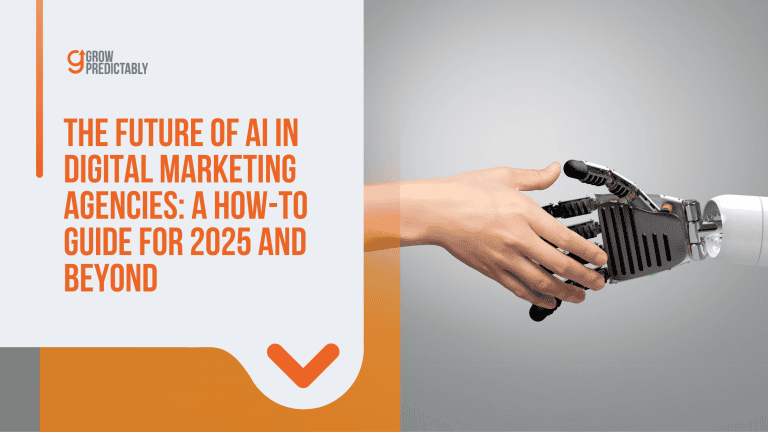
![Tired of Manual SEO? Try These 6 AI Tools for Instant Site Audits & Analysis [2026]](https://growpredictably.com/wp-content/uploads/2024/07/AI-Tools-768x432.png)
